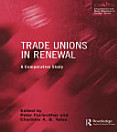Changing Prospects for Trade Unionism
Peter Fairbrother · Gerard Griffin
ต.ค. 2013 · Routledge
eBook
256
หน้า
family_home
มีสิทธิ์
info
reportคะแนนและรีวิวไม่ได้รับการตรวจสอบยืนยัน ดูข้อมูลเพิ่มเติม
เกี่ยวกับ eBook เล่มนี้
Trade union movements in many countries face uncertain futures. After three decades of extensive economic restructuring at both national and international levels, often accompanied by major legislative reforms, the way forward for unions is unclear. Throughout the 1980s and into the 1990s, in most developed economies, union membership declined massively and union leaders and their members lost their former prominence and their place in the polity. Will trade unions be able to re-establish their past salience in the bargaining arena and in the polity? Or, given the uncertainties of internationalized economies and states, will the first decade of this new century see further declines in union strength and power? This book examines these and related questions by exploring the background, current roles and prospects of trade unions in six English-speaking countries.
เกี่ยวกับผู้แต่ง
Peter Fairbrother, Gerard Griffin
ให้คะแนน eBook นี้
แสดงความเห็นของคุณให้เรารับรู้
ข้อมูลในการอ่าน
สมาร์ทโฟนและแท็บเล็ต
ติดตั้งแอป Google Play Books สำหรับ Android และ iPad/iPhone แอปจะซิงค์โดยอัตโนมัติกับบัญชีของคุณ และช่วยให้คุณอ่านแบบออนไลน์หรือออฟไลน์ได้ทุกที่
แล็ปท็อปและคอมพิวเตอร์
คุณฟังหนังสือเสียงที่ซื้อจาก Google Play โดยใช้เว็บเบราว์เซอร์ในคอมพิวเตอร์ได้
eReader และอุปกรณ์อื่นๆ
หากต้องการอ่านบนอุปกรณ์ e-ink เช่น Kobo eReader คุณจะต้องดาวน์โหลดและโอนไฟล์ไปยังอุปกรณ์ของคุณ โปรดทำตามวิธีการอย่างละเอียดในศูนย์ช่วยเหลือเพื่อโอนไฟล์ไปยัง eReader ที่รองรับ





